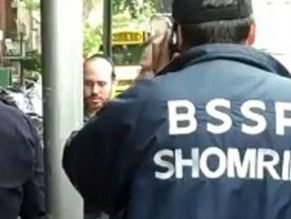|
World Jewish News

The Brooklyn South Safety Patrol. Photo by BPShomrim.org / Forward
|
Vigilante Justice and the Jews
14.05.2012, Jews and Society In early May, a circuit court judge in Baltimore found Eliyahu Werdesheim, a 24-year-old member of a local Shomrim anti-crime patrol, guilty of assaulting a teenager named Corey Ausby. According to prosecutors, in 2010 Werdesheim and his brother, Avi, set upon Ausby on a residential street in Northwest Baltimore and beat him with the butt of a two-way radio. Werdesheim, for his part, claims he acted only in self-defense: Ausby was brandishing a nail-studded board, he told reporters. He now faces up to a decade behind bars.
Unsurprisingly, the case has drawn a good deal of media attention, both for its passing resemblance to the Trayvon Martin debacle — attorneys for the Werdesheims, worried about jury prejudice, asked for a bench trial — and because of the background of the victim and aggressors. Ausby is black. The Werdesheims are white. Battle lines have been drawn accordingly.
“If the culprits were African American, some people feel justice would’ve been swifter,” the president of the Baltimore chapter of the Southern Christian Leadership Conference has said. On their way into the courtroom every morning, the Werdesheims marched past a scrum of black-jacketed Hasidic and Orthodox supporters who proudly held aloft signs bearing the message “Safety is our right.”
The spectacle was new for Baltimore, where the Shomrim are a relatively recent phenomenon: According to the official website of the Shomrim of Baltimore, the patrol was founded in 2005. It would not have been new for Brooklyn, where Hasidic anti-crime organizations have been active for decades. For the most part, the Shomrim — from the Hebrew for “watchers” — are viewed as a benevolent presence. They fix flat tires, maintain order at parades and religious events and organize foot patrols to track down missing individuals. (Famously, the Boro Park Shomrim managed to rapidly mobilize hundreds of residents after the 2011 disappearance of Leiby Kletzky, a young Hasidic boy eventually found murdered.)
Although it is often difficult for outsiders to understand, distrust of the police in Orthodox and Hasidic worlds runs extremely deep. Shomrim members, all volunteers, usually describe their roles as those of intermediaries, liaisons between city and community.
Three years ago, when I first began researching a book on the Shomrim, I was surprised to hear otherwise levelheaded Hasidic acquaintances tell me that in the case of an emergency, they would notify the Shomrim first, and only later — if at all — the New York City Police Department. In areas hit particularly hard by crime and patrolled only lightly by police, the Shomrim are often seen as providing an essential bulwark against “outside” elements, which are almost always black or Hispanic. In a best-case scenario, the Shomrim can get to a crime scene before the authorities and provide essential data to the police.
By Matthew Shaer
The Jewish Daily Forward
|
|
